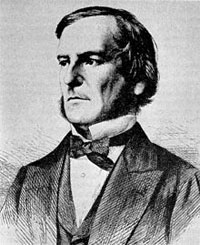George Boole
Born November 2, 1815, Lincoln, NY; died December 8, 1864, Cork, Ireland; British creator of a logic and a number system that bears his name.

Boole's father was a simple tradesman skilled in the construction of optical instruments, but extremely interested in mathematics and sciences, an interest which he passed on to his son. George Boole attended an elementary school in Lincoln, where he was described by one of his classmates as "being of a shy and retiring disposition," [Boole, 1852] but it was from his father that he acquired his fundamental instruction in mathematics. At an early age he was more interested in classical languages and was tutored in the rudiments of Latin by William Brooke, a local bookseller. Boole and Brooke remained close throughout his life and maintained an uninterrupted correspondence. Independently Boole added Greek to his repertoire. At the age of 14 Boole's father sent his metric translation of an "Ode of Homer" to the local newspaper with an annotation regarding his age. A local schoolmaster challenged the entry, thereby sparking a controversy which lasted many weeks.
At the age of 16 Boole undertook employment as an assistant teacher at a school in Doncaster (Yorkshire). He returned to the Lincoln area by taking a similar position in Waddington, where he began studies of modern languages and religion. These studies were to be left unfinished, however, since his finances were becoming limited by the dependence of his parents on his support.
In his twentieth year, Boole opened a school of his own in Lincoln, only to return to Waddington shortly thereafter when the schoolmaster there died. Throughout this period he continued his independent studies and began to write his first memoirs on mathematics. His first paper was entitled "On Certain Theorems in the Calculus of Variations." From this start and based on subsequent studies, he developed what is now regarded as the foundation for modern higher algebra. The publication of his papers was significantly assisted by the work of D.F. Gregory, the editor of the Cambridge Mathematical Journal. Gregory and other friends suggested that Boole take courses in mathematics at the University of Cambridge, but because of the paucity of his finances he was unable to take up this opportunity.
Boole was able to understand the separation of symbols and values, and based on this insight saw that relationships represented by symbols could be manipulated mathematically--thus founding the concept of symbolic logic. These finding were published in the Transactions of the Royal Society of London; in return the Society awarded him a medal.
As a result of his achievements, Boole was offered the chair of mathematics at Queen's University at Cork, Ireland in 1848, shortly after the publication of his book Mathematical Analysis of Logic. This opportunity allowed him to extend his studies and to produce a work, regarded as his most significant, entitled "An Investigation of the Laws of Thought," which had the subtitle "on which are founded the mathematical theories of logic and probabilities." Later he added Differential Equations and Finite Differences to his list of publications.
To make up for his lack of formal training and consequent paper qualifications, Boole was awarded honorary degrees from Dublin and Oxford Universities; the Royal Society elected him as a fellow, and in 1858 he was elected as an honorary member of the Cambridge Philosophical Society.
In late 1864 Boole walked to Queen's University from his home-a distance of just over 2 miles -- in a rain storm, and then gave his lecture. Suffering from pneumonia, Boole died at the age of 50 on December 8, 1864.
BIBLIOGRAPHY
Biographical
>MacFarlane, Alexander, Ten British Mathematicians, John Wiley and Sons, New York, 1916, pp. 50-53.
Significant Publications
Boole, George, Mathematical Analysis of Thought, 1847.
Boole, George, Studies in Logic and Probability, Open Court Pub. Co., 1852.
Boole, George, An Investigation of the Laws of 'Thought, 1854; reprinted Dover, 1951.
Boole, George, Treatise on Differential Equations, 1859.
Boole, George, Calculus of Finite Differences, Chelsea Pub. Co., 1860; reprinted 1970.
Boole, George, Collected Logical Works, Open Court Pub. Co., La Salle, Ill., 1952.
UPDATES
Portrait inserted, MRW, 2012.
New content Copyright © 2013-2023 by the IEEE Computer Society and the Institute of Electrical and Electronics Engineers Inc.
All rights reserved. This material may not be reproduced or redistributed without the express written permission of the copyright holder.
